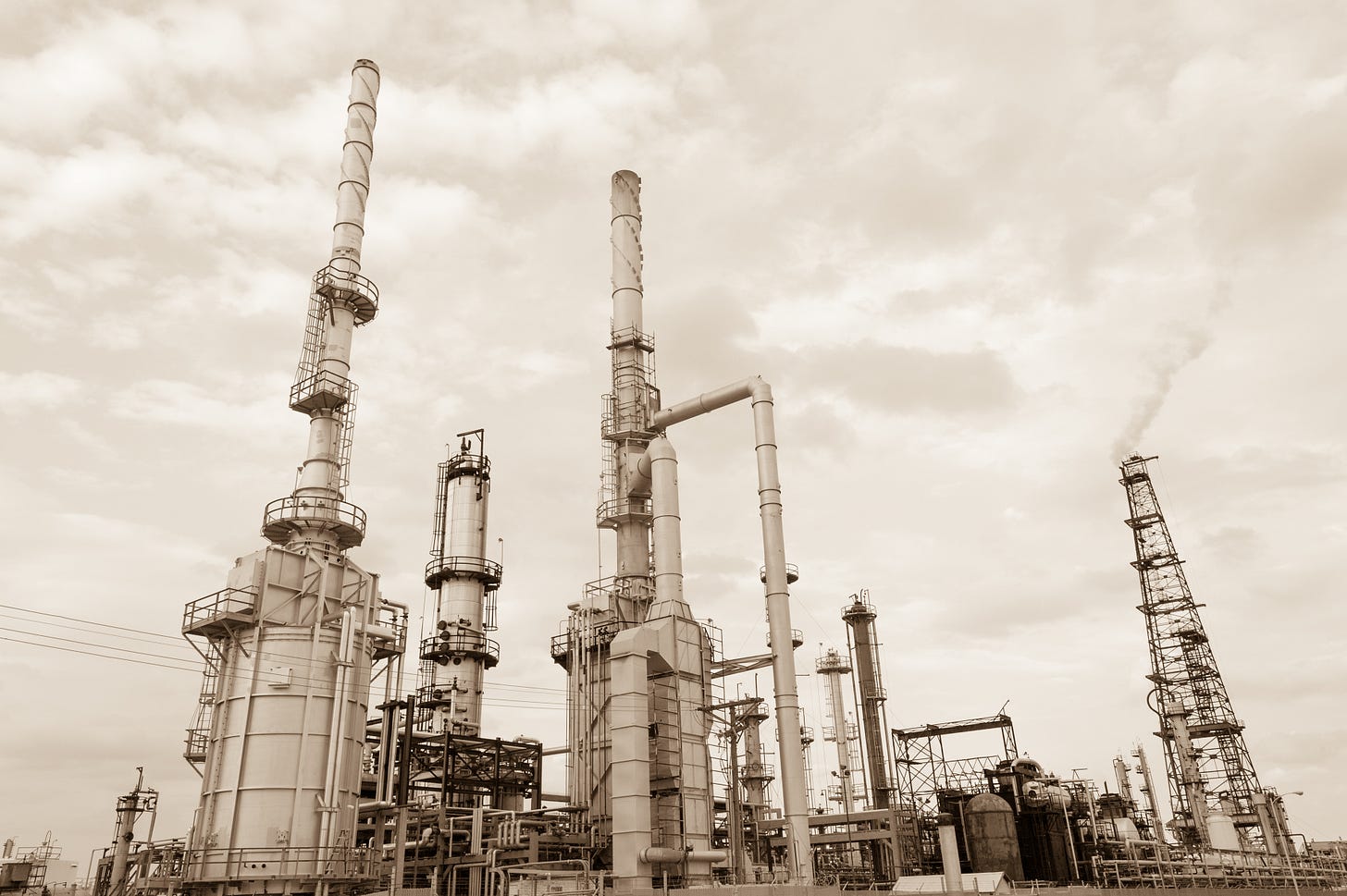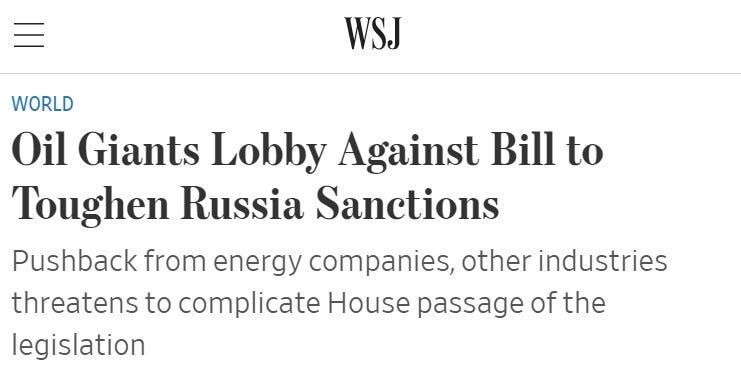The audacity of oil
The American Petroleum Institute (API), the lobbying arm of the oil and gas industry, has intensified its efforts to exploit Russia's invasion of Ukraine to push the United States government to roll back environmental protections, open up more federal land for drilling, and greenlight the construction of pipelines.
In a March 4 press release, API suggested Biden was responsible for Russia's decision to invade Ukraine because he failed to cater to the fossil fuel industry. According to API, the fact that the Biden administration considered taxes on the industry and talked about using more clean energy in the future encouraged Putin to attack.
The time for helping Ukraine with American energy was months ago. Then, Biden administration support for robust U.S. production might have helped deter Moscow from thinking that European nations dependent on Russian energy might do less to oppose Russia the aggressor.
Instead, the administration discouraged American energy. For more than a year it has halted new federal leasing – key to future energy investment and production. It canceled energy infrastructure, blocked development in parts of Alaska, entertained new taxes to punish the U.S. energy industry and chilled future investment by signaling that oil and gas wouldn’t be part of America’s future energy mix.
Some of API's claims are simply false. Biden "has outpaced Donald Trump in issuing drilling permits on public lands." There are currently are "9,000 approved oil leases that the oil companies are not tapping." Other claims are misdirection. Biden did nix the Keystone XL pipeline, but the pipeline would not have had any impact on Europe's dependence on Russian energy. More fundamentally, the current level of fossil fuel production in the United States does not reflect the industry's capacity but, rather, its desire to keep supplies constrained and prices high.
API presents itself and the fossil fuel corporations it represents as the solution to Russian aggression. But American oil and gas companies have spent years partnering with Russia, bolstering Putin's regime with a critical source of cash and influence. API, meanwhile, has consistently, and often successfully, sought to block or weakened sanctions proposed in response to Russian aggression.
United States fossil fuel companies aren't producing more because shareholders prefer windfall profits
Scott Sheffield, CEO of Pioneer Natural Resources, the largest shale oil operator in the United States, said that the industry would not increase production this year. This is due to "demands from Wall Street that operators use their oil price windfall to pay dividends." In other words, shareholders prefer to keep the supply constrained and prices high.
Current domestic production of oil remains well below existing capacity. Prior to the pandemic, the United States was producing about 13 million barrels per day. It is currently producing about 11.6 million barrels. Any effort to accelerate production "would require investors’ blessing."
In January, Exxon CEO Darren Woods said he was focused on the "profitability of the barrels that we're producing" rather than "volume and volume targets."
The push by API for immediate policy changes has little to do with the current crisis in Ukraine. The industry has made clear it does not plan to increase production any time soon. Rather, it is an effort to exploit the crisis to undercut long-term efforts to transition to clean energy.
How the fossil fuel industry empowered Putin
API and the companies it represents have been key allies of Putin. Most directly, several major fossil fuel companies partnered with Russian state-owned companies to help Putin monetize oil and gas. Exxon continued its partnership with the Russian government after Russia's 2014 invasion of Crimea and only decided to exit the arrangement this month. Halliburton, an API member which helps operate Russian oil fields, has not announced any changes to its operations in the country.
In Washington DC, API has used its considerable influence to block or weaken sanctions proposed in response to Russian aggression in Ukraine. In 2014, after Russia's invasion of Crimea, API was part of a coalition, known as USA Engage, that sought to weaken the sanctions imposed by the United States in response. The group endevored "to communicate concerns about collateral damages to U.S. interests" related to sanctions against Russia.
In 2017, when Congress was constructing new sanctions in response to Russia's interference with the 2016 presidential election, API lobbied against a provision "would’ve banned U.S. businesses from working on international oil projects that involved any sanctioned Russian partners." According to the Wall Street Journal, "lobbying by Exxon and other big oil companies is part of a push to preserve potential business relationships with Russia."
The ban was included in the Senate version of the legislation but removed in the House version, which ultimately became law. API and Exxon found a champion in Congressman Pete Sessions (R-TX) who said he was "representing companies in the energy industry that don’t want to be blocked from these deals." The House version allowed oil companies to continue work on projects even if sanctioned Russian partners had an ownership stake up to 33%. "The amended bill more appropriately focuses sanctions on the intended target — Russia and its energy firms — rather than inadvertently benefiting Russia at the expense of U.S. companies," API’s Marty Durbin said after the sanctions bill was diluted.
In 2019, API testified against legislation "which aims to stop construction of the Gazprom-backed Nord Stream 2 pipeline that would carry Russian natural gas across the Baltic Sea to Germany." API president Mike Sommers told Senators that the "legislation seeks to impose unilateral sanctions that will harm American companies." (The bill become law over API's objections. Although Russia was ultimately able to complete the pipeline, Germany shut down the project after Russia's invasion of Ukraine last month.)
In January 2022, as Russian forces were amassing at the Ukranian border, API was once against seeking to weaken the U.S. response. "We continue to urge policymakers to consider the unintended consequences that sanctions can have on US business interests abroad and to ensure that they are as targeted as possible to limit those consequences," an API spokesperson told Oil Daily.





Go get 'em Judd. Like water and oil, it seems oil and democracy don't mix well.
And this, just this morning, from fellow Substacker Walt Hickey's Numlock News:
Building codes are incredibly technical, and for that reason the codes produced every three years by the ICC — a group that takes input from governments, industry and environmentalists — are the boilerplate building codes adopted by local municipalities around the country. For such a niche topic, there’s a ton on the line here; the energy use of buildings is around 40 percent of all carbon emissions, factoring in the cost of heating them. In 2019, lots of cities that were ticked off with how slowly the ICC was upping the energy efficiency requirements of homes got motivated and started ramping up participation. The effect was massive: The 2018 code improved efficiency by 1 percent, but the 2021 code increased efficiency by up to 14 percent, which would reduce up to 50 million metric tons of carbon dioxide by 2030. That success triggered a reaction from the industry, though; last March, they revoked local official’s vote on the final version of codes, and already gas companies are getting new potential requirements about in-home electric vehicle charging infrastructure pulled from the 2024 code.
Alexander C. Kaufman, HuffPost
https://www.huffpost.com/entry/building-codes-climate_n_621e4b69e4b0afc668c68e59